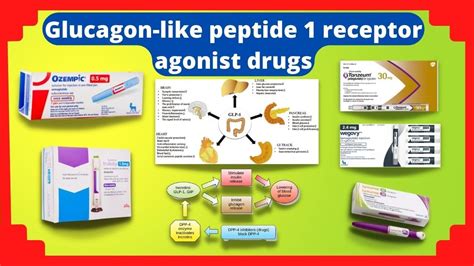Glucagon-like Peptide-1 Receptor Agonists - Diabetes Medication
Glucagon-like Peptide-1 Receptor Agonists FAQ
What are glucagon-like peptide-1 agonists?
Glucagon-like peptide-1 (GLP-1) agonists (also known as GLP-1 receptor agonists, incretin mimetics, or GLP-1 analogs) represent a class of medications used to treat type 2 diabetes mellitus and, in some cases, obesity. Examples of drugs in this class include exenatide, lixisenatide, liraglutide, albiglutide, dulaglutide, and semaglutide.
What are GLP-1 agonists?
GLP-1 agonists are a class of medications that mainly help manage blood sugar (glucose) levels in people with Type 2 diabetes. Some GLP-1 agonists can also help treat obesity. GLP-1 agonists are most often injectable medications, meaning you inject a liquid medication with a needle and syringe.
Are glucagon-like peptide 1 and GLP-1 receptor agonists a cardiovascular complication?
Possible cardiovascular actions of glucagon-like peptide 1 (GLP-1) and GLP-1 receptor agonists (GLP-1RAs). Diabetic kidney disease is a complication of diabetes that leads to increased mortality ( 40 ). Most GLP-1RA CVOTs incorporated secondary exploratory renal endpoints.
Can a GLP-1 agonist help with Type 2 diabetes?
If you become pregnant or are thinking of becoming pregnant. A note from Cleveland Clinic There’s no “best” way to manage Type 2 diabetes or obesity. Every person is unique and so is each treatment plan. But GLP-1 agonists may help. Talk to your healthcare provider to see if a GLP-1 agonist is right for you. They’re available to help.
What are glucagon-like peptide-1 receptor agonists?
Glucagon-like peptide-1 (GLP-1) receptor agonists, also known as GLP-1 analogs, GLP-1DAs or incretin mimetics, are a class of drugs that reduce blood sugar and energy intake by activating the GLP-1 receptor. They mimic the actions of the endogenous incretin hormone GLP-1 that is released by the gut after eating.
Glucagon-like Peptide-1 Receptor Agonists References
If you want to know more about Glucagon-like Peptide-1 Receptor Agonists, consider exploring links below:
What Is Glucagon-like Peptide-1 Receptor Agonists
- https://my.clevelandclinic.org/health/treatments/13901-glp-1-agonists
- https://en.wikipedia.org/wiki/GLP-1_receptor_agonist
- https://www.ncbi.nlm.nih.gov/books/NBK551568/
Glucagon-like Peptide-1 Receptor Agonists Information
- https://cks.nice.org.uk/topics/diabetes-type-2/prescribing-information/glp-1-receptor-agonists/
- https://www.guysandstthomas.nhs.uk/health-information/diabetes-medicines-glp-1-agonists
- https://www.diabetes.co.uk/diabetes-medication/incretin-mimetics.html
- https://www.uptodate.com/contents/glucagon-like-peptide-1-based-therapies-for-the-treatment-of-type-2-diabetes-mellitus
Explore Related Topics
Precision Medicine in Diabetes: Is Individualized Treatment the Key?
Delve into the concept of precision medicine for diabetes
Medication Side Effects: Balancing Risk and Rewards in Diabetes Management
Explore the common side effects of diabetes medications
Chamomile: More Than Just a Soothing Tea?
Explore the lesser-known benefits of chamomile for diabetes management.
Yoga for Diabetes: What's the Connection?
Delve into the link between yoga and managing stress associated with diabetes
Is HbA1c Testing the Gold Standard for Monitoring Diabetes Control?
Explore the accuracy and significance of HbA1c testing in diabetes management
Is Fiber the Key to Managing Blood Sugar?
Discover how incorporating fiber-rich foods in your diet can help regulate blood sugar levels in diabetes patients.
